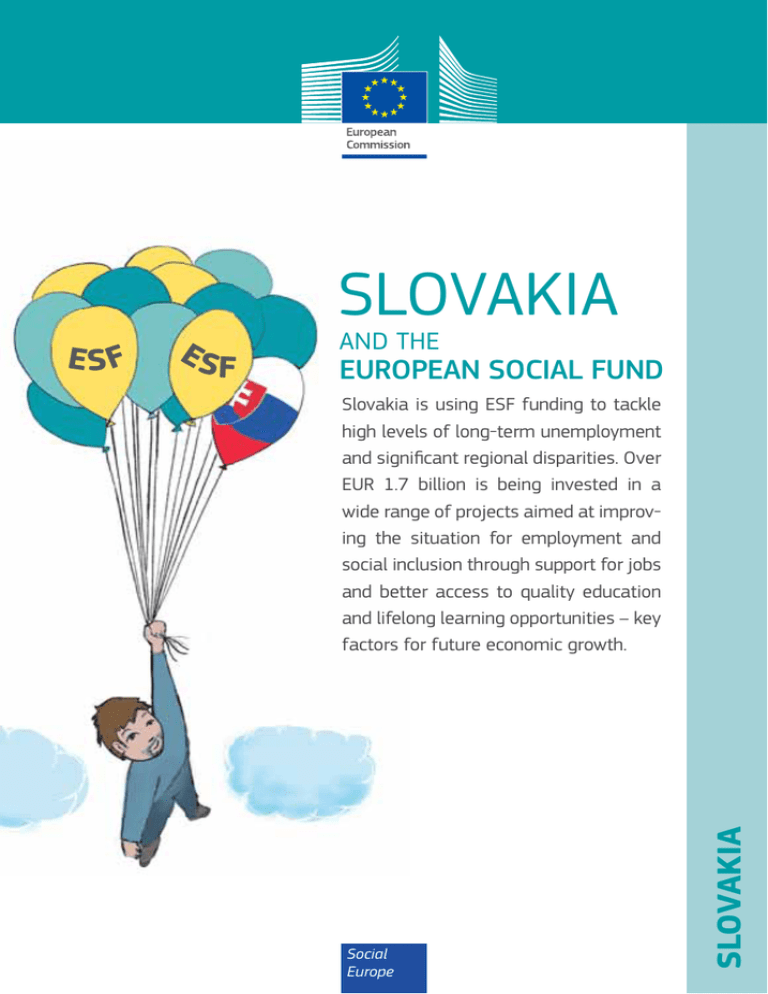Slovakia and the European Social Fund
advertisement

SLOVAKIA ES AND THE F EUROPEAN SOCIAL FUND Slovakia is using ESF funding to tackle high levels of long-term unemployment and significant regional disparities. Over EUR 1.7 billion is being invested in a wide range of projects aimed at improving the situation for employment and social inclusion through support for jobs and better access to quality education and lifelong learning opportunities – key factors for future economic growth. Social Europe SLOVAKIA ESF INVESTING IN PEOPLE AND JOBS: THE OPPORTUNITIES FOR SLOVAKIA Although Slovakia is one of the fastest growing EU economies, it does face a number of key challenges, including high long-term unemployment levels and marked differences in regional economic development. Nevertheless, Slovakia aims to increase the employment rate to 72 % by 2020. To achieve this, it must give long-term unemployed jobseekers the skills to improve their job prospects and benefit from the opportunities offered by a growing economy. In addition, the population of Slovakia is ageing relatively rapidly, so older workers must be helped with new skills and opportunities such that they can work for longer. Slovakia’s specialisation in manufactured goods and its openness to trade made it vulnerable to the global recession, resulting in higher unemployment – most markedly in the manufacturing sector and among low-skilled workers and the young. The potential for job ccreation eation in the future is expected to come increasingly from the services sector rather than from industry. In response, Slovakia is investing heavily in education and training to adapt the knowledge and skills of workers such that they can benefit from this changing employment MICROFINANCE ENTREPRENEURSHIP E EN TREPRENEURSHIP market. In particular, the country is investing in R&D activities and the highly qualified workers these demand through boosting the number of graduates. Slovakia is aiming for 40 % of its young people (aged 30-34) to have completed a tertiary-level qualification by 2020. “Towards 72 % in work by 2020” Slovakia is also taking determined steps to help people living in its less-developed regions, and in particular the Roma. A key element of this is to improve social inclusion by concentrating on improving the education system, especially for early school years. Better trained teachers and programmes to support the most disadvantaged children are among the measures needed which will help to maintain Slovakia’s less-than 6 % school drop-out rate and to li 170 000 people out of the risk of poverty and social exclusion by 2020. ESF spending in Slovakia Slovakia is receiving nearly EUR 1.5 billion in EU funding for the period 2007-2013. With national co-funding, the total amount being spent on jobs and education in Slovakia is EUR 1.76 billion. A wide variety of actions are being supported through two ESF programmes covering employment and social inclusion, and education. NET WOR KING SLOVAKIA’S ESF PRIORITIES More jobs for more people The main objective of ESF funding is to reduce long-term unemployment and boost employment. The ESF is therefore financing measures to improve the adaptability and skills of workers and support a culture of lifelong learning. This is helping people acquire the skills they need to find jobs and further develop their careers – and this at any time of their life. Public employment services are being improved and expanded so as to reach as many people as possible. From 2007 to 2011, around 24 000 new jobs had been created and approximately 26 000 people had found work through ESF-supported measures. “Instilling a culture of lifelong learning” Improving skill levels among vulnerable groups – the long-term unemployed, young people, women, the elderly and disabled, and among disadvantaged groups such as the Roma – is also helping to build a more inclusive society. Particular efforts are being made to reduce regional disparities in employment, for example in many projects to increase school attendance, improve access to health services, and provide more leisure facilities. Another example is a project implementing a flood-defence programme that offers up to 4 500 new jobs in 200 village communities. Building a learning culture The ESF is supporting Slovakia in completing the reform of the education system, which is raising the quality of both content and teaching procedures so as to ensure that education is more closely adapted to the changing needs of a modern society. It is also supporting greater emphasis on science and technology teaching, as well as foreign languages, as drivers of future development. An example is a project to investigate young people’s interests and match these to career guidance – including the identification of the skills needed for them to attain their career goals. ESF-funded projects are helping to establish a lifelong-learning culture that develops key competences and skills and is accessible to all Slovak citizens throughout their lives, enabling them to raise their qualifications in accordance with employers’ demands. For example, a Slovak packaging company used ESF funding to provide professional training and new skills, such as in quality and environmental standards, for 304 staff members – thus making them more adaptable and better equipped for their future careers. KE-30-12-479-EN-C THE ESF IN SLOVAKIA: SOME EXAMPLES Better conditions for the Roma A boost to science education Many ESF projects are addressing the specific needs of the Roma community in Slovakia. In the town of Dobšiná, one such project is providing targeted assistance to excluded sections of its population, especially the Roma people who tend to live in segregated settlements and are more exposed than the average population to longterm unemployment, low levels of education and living in conditions of poverty. Thanks to ESF funding, the town has assigned one social worker and two assistants to work closely with these communities, providing personalised help and guidance aimed at improving their difficult circumstances – in particular through better school attendance, improved health, leisure activities for children and young people, and better use of social benefits within the community. Over 200 such projects have been supported throughout the country. The ESF co-funded ‘Inovácia vzdelávania’ project improved science teaching in schools to boost science education generally and to attract more young people to scientific careers. The project introduced teachers to new methods of teaching incorporating the use of new technologies, as well as of the English language and English terminology. Teachers were instructed on how best to integrate English terminology into their lessons in biology, geography, chemistry and physics, and were encouraged to use the new skills and methodologies for students aged between 10 and 15. The project had a marked impact on the enthusiasm of students, as well as on their general environmental awareness. Do you want to…? …lea more about the ESF in Slovakia? …learn …understand better how the ESF works? …und …see video clips on projects from across the EU? Then visit the ESF website: http://ec.europa.eu/esf/slovakia http: TRAINING JOBS NEW INNOVATION SKILLS © European Union, 2012 Reproduction is authorised provided the source is acknowledged. ISBN 978-92-79-23462-0

